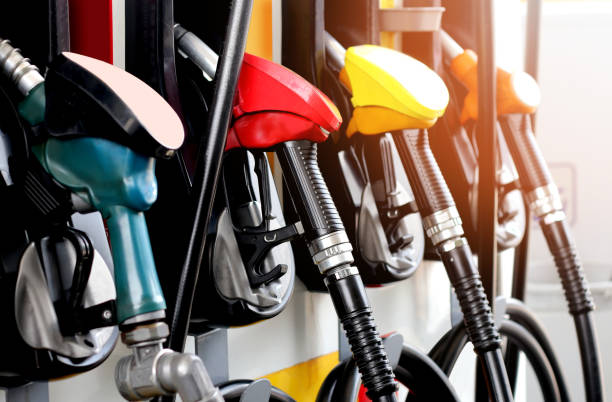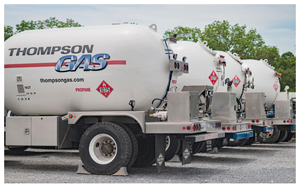ThompsonGas Pioneers Propane Autogas with Easy Three-Step Process

ThompsonGas, a prominent propane retailer in the United States, has reaffirmed its commitment to propane autogas by expanding its fleet of propane vehicles. Intending to showcase its belief in propane and its technology, ThompsonGas aims to lead by example in the industry. Monte McLeod, the director of autogas at ThompsonGas, emphasized the company’s dedication to propane autogas and its customers.
The process of adopting propane autogas vehicles, as spearheaded by McLeod, involves three simple steps that streamline the transition:
Step 1: Place an Order with Your Preferred Dealer
Ordering propane vehicles is as straightforward as ordering gasoline or diesel vehicles with a similar lead time. ThompsonGas also explored converting their existing non-gaseous prepped vehicles to run on propane which would have taken approximately 12 hours. The company recently added ten new Ford F-750 delivery trucks equipped with Roush CleanTech fuel systems to its fleet, bringing the total number of propane vehicles to 130, with more on order. These trucks meet the ultra-low nitrogen oxide level of 0.02 g, surpassing the strictest heavy-duty engine standards and achieving an impressive 90% reduction in emissions compared to conventional vehicles.
Step 2: Create Your Own Affordable Fueling Infrastructure
Propane autogas offers cost-effective fueling infrastructure options. Propane stations are more affordable to set up than stations for diesel, gasoline, compressed natural gas (CNG), or electric vehicles. Fleets can collaborate with their local propane supplier to ensure a smooth and cost-effective experience. Propane autogas dispensers use the same fuel management systems as gasoline and diesel, operating at a similar rate of approximately 10 gallons per minute. ThompsonGas simplified its infrastructure set-up by incorporating a dispenser, pump, and storage tank on a skid, enabling easy installation.
Propane suppliers offer valuable services to assist fleets in choosing the right fueling option based on fleet size, routes, budget, and facility space. These services include infrastructure installation, compliance assurance, customized fueling schedules, and fuel contracts to stabilize prices.
Step 3: Maintain and Operate Your Vehicles the Same Way You Always Have at a Lower Cost
Maintenance for ThompsonGas’s propane vehicles is more accessible and cost-effective compared to their other vehicle types. Propane trucks eliminate the need for many burdensome and expensive after-treatment measures required for diesel trucks. ThompsonGas did not require specialized technicians or modifications to maintenance buildings or diagnostic systems. Existing maintenance facilities approved for gasoline or diesel work do not need ventilation modifications. Furthermore, Roush CleanTech propane fuel systems are compatible with Ford integrated diagnostic system equipment, making maintenance processes seamless and familiar for technicians.
ThompsonGas has experienced numerous benefits with its propane vehicles. Mark Draughn, a driver for ThompsonGas, expressed his satisfaction with the vehicles’ performance, including their ability to cover long distances on daily routes, ease of refueling, and overall handling. Draughn noted that the reduced noise level, approximately half that of a diesel engine, is the only noticeable difference in drivability.
 Propane autogas offers the lowest cost of ownership compared to other fuel types. ThompsonGas achieves a 60% lower cost per mile for its propane vehicles than diesel-powered models.With simplified maintenance requirements, the company estimates that its propane vehicles will last between 250,000 and 300,000 miles.
Propane autogas offers the lowest cost of ownership compared to other fuel types. ThompsonGas achieves a 60% lower cost per mile for its propane vehicles than diesel-powered models.With simplified maintenance requirements, the company estimates that its propane vehicles will last between 250,000 and 300,000 miles.
Lower fuel costs, reduced maintenance, and a favorable total cost of ownership contribute to ThompsonGas running its business more efficiently.
ThompsonGas currently experiences a remarkable 70% fuel savings compared to diesel, making propane autogas a cost-effective choice. Historically, propane autogas costs approximately 50% less per gallon than diesel.
ThompsonGas encourages all propane marketers to drive vehicles powered by the fuel they sell. By doing so, they benefit from fuel savings and environmental advantages while demonstrating their genuine belief in propane as a reliable and sustainable fuel source.
To further enhance propane safety measures, take advantage of the safety training programs on the TankSpotter.com app and explore the safety consulting services offered by PropaneSafetyPro.com, ensuring a comprehensive and proactive approach to propane autogas utilization.
















